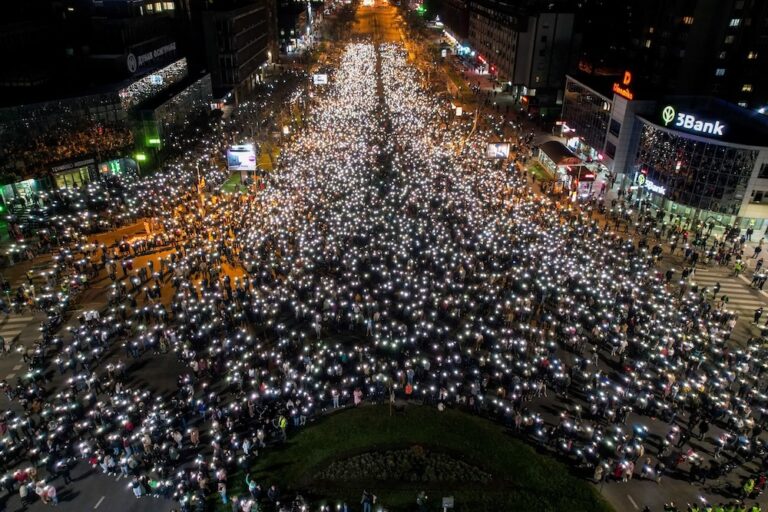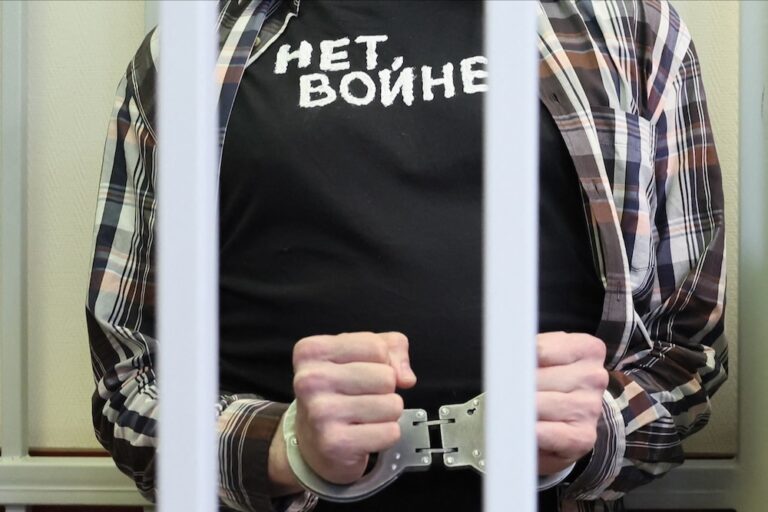In honour of the International Day to End Impunity, CJES has published a report outlining the challenges faced by journalists in Russia.
(CJES/IFEX) – November 25, 2011 – “Now, in the 21st century, it has become dangerous to be a journalist, a photographer, a media assistant, dangerous to write about corruption and investigate events. Over 150 cases of obstruction of journalistic activities and threats to members of the press have been registered since the beginning of this year, but virtually no criminal cases have been opened and no incidents have been investigated. Impunity has become a key word for the understanding of the current situation of the press in Russia,” said Pavel Gusev, the head of a Russian Public Chamber commission, at a plenary session entitled “Media Issues: Societal Expectations and Reality” on November 2.
Now we will talk about the death of our colleagues, journalists, about the events that occurred over the past ten years, about impunity and tragic numbers. We will again talk about the hardest and the most painful things.
This year, the International Freedom of Expression Exchange (IFEX, http://www.ifex.cjes.ru ) declared November 23 the International Day to End Impunity. This date was selected in memory of the largest killing of members of the press (30 journalists and two media assistants) in the Maguindanao province of the Philippines on November 23, 2009. A total of 57 people were killed. According to the Committee to Protect Journalists (CPJ), charges have been filed against almost 200 people, but there is no confidence that justice will prevail ( http://www.cpj.org/ru/2010/04/post-2.php )
The International Day to End Impunity is calling on us all to unite our efforts and demand justice for those who were killed for telling the truth. Every day, journalists, musicians, artists, politicians, and defenders of freedom of speech are silenced worldwide every day. Their persecutors are not threatened by any consequences and the authorities often do not investigate these incidents. The purpose of the International Day to End Impunity is to cast light on this issue.
The Glasnost Defense Foundation ( http://www.gdf.ru ) and the Center for Journalism in Extreme Situations have been monitoring violations of journalists’ rights for many years. Two important databases have recently been made on the basis of this monitoring under a joint project of the International Federation of Journalists and the Russian Union of Journalists ( http://www.journalists-in-russia.org ), as well as a database of conflicts in the media, which comprises categories such as threats, attacks, detentions, criminal prosecution, dismissals and censorship of journalists ( http://mediaconflictsinrussia.org ).
In 2009, the International Federation of Journalists issued a wonderful report entitled “Partial Justice,” a review into the deaths of journalists in Russia in 1993-2009″ ( http://www.ruj.ru/2009/pjustice_090909.pdf ).
In 2009, IFJ also published a detailed study of unsolved killings of journalists entitled Anatomy of Injustice ( http://www.cpj.org/ru/2009/09/russia-impunity.php ).
At a conference devoted to the safety of journalists in the Organization for Security and Cooperation in Europe (OSCE) held in Vilnius in June 2011, Mikhail Fedotov, Russian presidential adviser and chairman of the Russian presidential council on the development of civil society and human rights, presented a report entitled “Journalism Between Safety and Impunity.” ( http://www.osce.org/event/safety_2011 )
To try to defend themselves to continue their mission, journalists can only use their professional weapon, their words, by addressing their readers, viewers, and listeners.
Our report is an attempt to attract attention to the issue of impunity and remember those who paid the highest price for freedom of expression.
( . . . )


